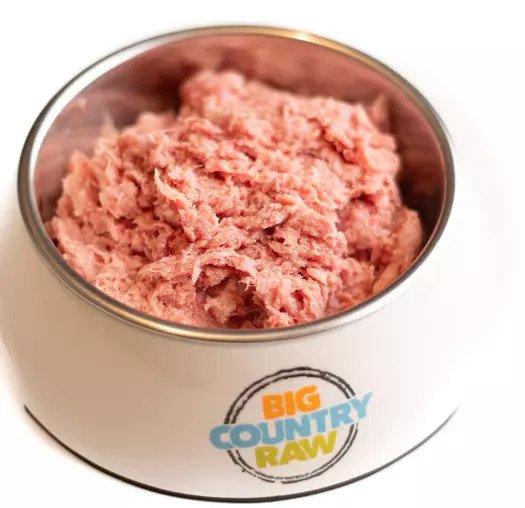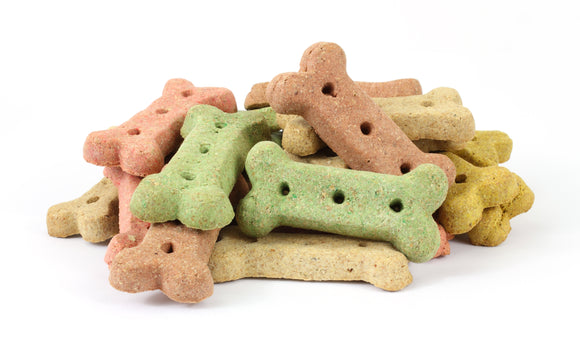
Puppy Nutrition 101 - Dog Food & Dog Nutrition (Part 2)
Table of Contents
Puppy Nutrition 101

The nutritional requirements of puppies are different from those of adult dogs, and when puppies are weaned, they gradually transition from mother's milk to solid food. There are many changes in the nutritional requirements of puppies in the first 5-6 months of age.
It is very important to give your puppies all the nutrients and calories they need in their food, and these nutrients must be balanced according to the development stage, and the nutrients must be palatable and highly digestible.
What Are the Puppy Nutritional Requirements, and Why Puppy Food Is Important?
The nutritional requirements of puppies are different at different stages of life. The nutritional needs of puppies largely depend on their breed, their physical size, and their age. For example, in the first few months of age, rapid body growth is observed in all breeds, but this growth is prolonged in puppies of large breeds such as Labrador Retrievers, Great Danes, and Doberman Pinschers.
Most breeds of dogs reach their adult size and are considered mature around 12 months of age, but in large breeds, they can continue to grow for two years to reach their adult size.
Diet For Large Breed Puppies
Large breed puppies typically require few calories per unit of body weight. This is because they mature slowly compared to small breed puppies. If large breed puppies are fed too many nutrients, their growth rate will increase, resulting in excessive weight gain.
This rapid growth and weight gain put a lot of pressure on your puppy's skeletal system. Large breed puppy food is manufactured in such a way that it will promote their body growth gradually. Their food has a lower level of phosphorus and calcium compared to other puppy foods because it can cause skeletal problems in them.
There are some special ingredients present in large breed puppy food that can help control its appetite; this aspect helps control accelerated growth, leading to skeletal problems. It is very important to monitor your puppy's food intake and weight needs.
Diet For Small Breed Puppies
Small breeds have a very fast growth rate than large breed puppies and require twice the energy compared to adult dog breeds. Most commercially available small breed puppy food is high in fat, protein, vitamins, and minerals to maintain energy levels.
Small breed puppies have to grow very large in a very short period, and they have to develop bones, muscles, skin, teeth, hair, and other parts of the body quickly. Giving your small breed puppy an exact diet early in life will result in amazing growth for your puppy.
Nutritional Requirement of Puppies
Protein
Puppies need protein in large amounts immediately after weaning due to their needs, but their protein requirement will decrease steadily after that. According to AAFCO recommended protein requirement for the proper growth of puppies is 22 to 23% based on DM. With this level of protein, your puppy will grow properly, and exceeding this level of protein is not recommended.
Fat
Fats are a concentrated form of energy and consist of many essential fatty acids. The fat content that puppies need for optimal growth is around 10-25% based on DM (Dry Matter). Excessive fat intake will lead to obesity and skeletal problems.
Calcium
The calcium requirement of large breed puppies and small breed puppies is a recent debate. You should be very careful when selecting a diet that meets your puppy's calcium requirements. It is recommended to follow the nutritional levels established by AAFCO for small and large breed puppies. The recommended calcium level is 0.7-1.7% based on Dry Matter.
Digestible Carbohydrates
Carbohydrates are not considered essential for the optimal growth of puppies, but it is recommended to provide 20% carbohydrates in the daily diet to maximize the growth of puppies.
Why is Puppy Food Important?

Puppy food is important because the growth rate of puppies varies by breed, but is highly dependent on nutrition, genetics, and environment. However, proper nutrition is essential to maintain body health and the development of puppies. Puppy nutrition plays a direct role in maintaining body growth and the immune system. However, the amount of food and the nutrient density of the food plays a role in the maximum and optimal growth of the puppies.
When to Feed Puppy Food and When to Switch to Adult Dog Food?
In the first days of the puppy's life, they feed on mother's milk, but at the age of 3 to 4 weeks, the transition phase begins. At first, the puppies are fed Gruel, and this feeding lasts for 7 to 8 weeks. Gruel is formed by adding warm milk and solid food to make a paste-like material.
The Gruel should slowly present to the puppies, and its consistency increases with each subsequent week until the puppies eat solid food. Gruel feeding helps a lot during this transition phase of puppies because it includes all the necessary vitamins and minerals.
After a few weeks, when the consistency of the Gruel is more of a solid type of food, the thicker version of the food is called "Mush."
Transition to Adult Dog Food
The transition from puppy food to adult dog food occurs when puppies reach almost 80% -90% of their expected body weight. Most breeds of dogs reach their adult body weight around 12 months, and other breeds can take up to 2 years to reach adult weight.
During the transition from puppy food to adult food, avoid any sudden changes in diet, and try to change food gradually over 7-10 days. The same is the technique to switch food from one brand to another because of any sudden change in the puppy's food can lead to digestive problems.
What is the Difference Between Puppy Food and Adult Dog Food?
Puppy food and adult dog food is different in many ways as puppies need more protein, minerals, fats, and vitamins compared to adult dogs. However, many puppy food manufacturing companies provide a higher amount of nutrients than the AAFCO nutritional requirements for puppies.
Similarly, caloric density varies greatly in puppy food and in adult dog food. Puppies need additional energy compared to adult dogs for proper body function.
Difference Between Puppy Food and All Life Stages Food?

According to the AAFCO (American Association of Food Control Officials), dog food is divided into three main categories: growth and reproduction, adult maintenance, and food for all life stages. The foods that are used for growth and reproduction are for those dogs that are less than one year old and for pregnant or nursing mothers.
The adult maintenance food is formulated to meet the nutritional needs of adult dogs, most of which are over one year old. Pet food labeled as food for all life stages is supposed to meet the nutritional requirements of a young, adult, and pregnant dogs.
From a scientific point of view and according to the formula of food for all stages of life, it must meet the nutritional requirement of food for puppies and adult dogs. But this all-stage dog food is not suitable for most puppies and adult dogs, as it contains a large number of vitamins, minerals, and proteins that are mostly not suitable for some puppies and adult dogs.
That is why most nutritionists recommend using specific food according to the stage of the dog's life.
How Much Puppy Food to Feed at a Certain Age?
When you want to know the amount of puppy food that is required at a certain age, then you should look for the feeding guide mentioned on the label of the dog food. It is usually written as how many cups your puppy needs according to body weight.
Here's a general feeding guideline by which you can get a rough idea of how much to feed your puppy in certain weeks or months.
|
Age |
Frequency |
Portion |
|
8 – 12 Weeks |
3-4 times/day |
Small Portions |
|
4 – 5 Months |
3 times/day |
Puppy Food |
|
6 – 8 Months |
2 times/day |
Puppy Food |
|
9 – 11 Months |
2 times/day |
Adult Food |
|
1 – 2 Year* |
2 times/day |
Adult Food |
|
2 Year +* |
2 times/day |
Adult Food |
* The portion size can be confirmed by the puppy food label or packaging according to your puppy's body weight.
* Small breeds reach adulthood at 12 months, but large breeds take up to 2 years, so transition to adult food accordingly.
Conclusion
Giving your puppy a special food designed per your puppy's nutritional requirements will give you peace of mind that you are addressing all of your puppy's nutritional needs. Always consult your veterinarian for a suitable feeding schedule according to age and body weight for your puppy.
References:
- https://www.aafco.org/Portals/0/SiteContent/Regulatory/Committees/Pet-Food/Reports/Pet_Food_Report_2013_Midyear-Proposed_Revisions_to_AAFCO_Nutrient_Profiles.pdf
- https://dogcare.dailypuppy.com/importance-puppy-food-1726.html
- https://breedingbusiness.com/puppy-mush-gruel/
- https://douglasfeedandpetsupply.com/blog/60619/is-your-puppy-ready-for-adult-dog-food
- https://www.petmd.com/blogs/nutritionnuggets/dr-coates/2016/january/whats-difference-between-adult-dog-food-and-puppy-food
- https://www.petfinder.com/dogs/dog-nutrition/how-much-to-feed-a-puppy/
- https://vcahospitals.com/know-your-pet/feeding-growing-puppies



